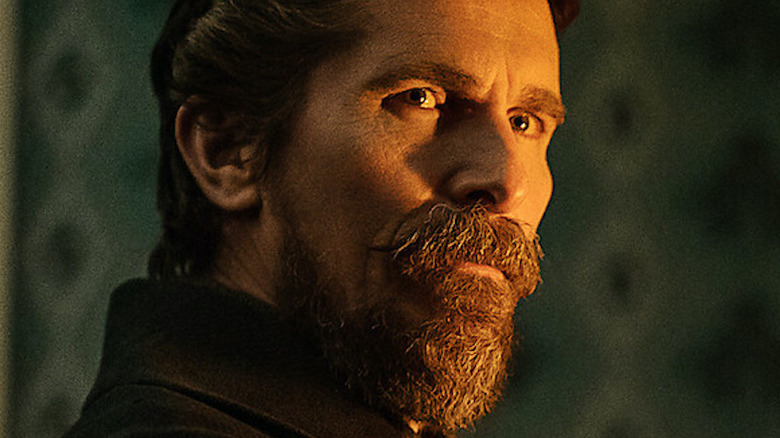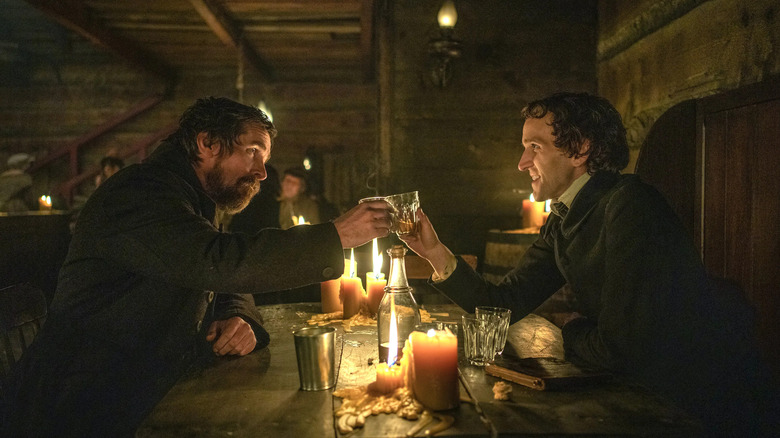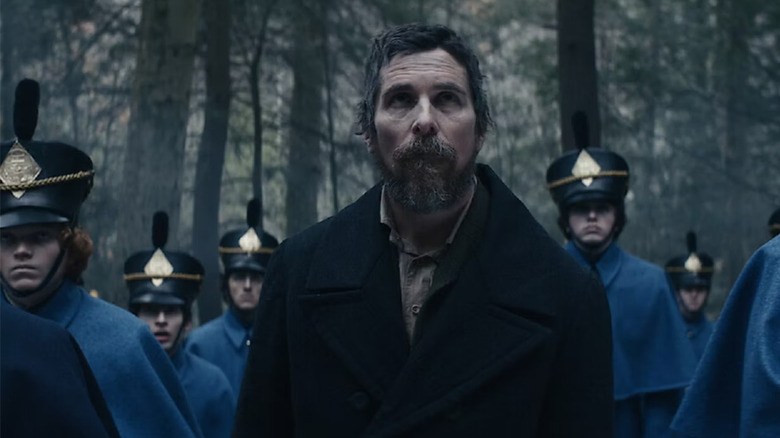The Pale Blue Eye Review: Once Upon A Midnight Dreary
- Built around a clever twist
- Harry Melling is acting in a better version of this movie
- Way too slow and self-serious for something often utterly preposterous
- Supporting performances don't work as well
What is the value of a twist ending in a movie that otherwise doesn't have much to offer? I fully expect most discussion of "The Pale Blue Eye," written and directed by Scott Cooper and adapted from the novel of the same name by Louis Bayard, to center around its shocking conclusion, which cleverly recontextualizes everything that we've seen leading up to it. For some viewers, it might even be enough to want to rewatch the movie with fresh eyes.
Alas, the movie leading up to this ending doesn't really have that much else going for it beyond a promising historical fiction mystery premise and two solid lead performances. In execution, "The Pale Blue Eye" isn't a particularly bad film, but it is an unfortunately dull and self-serious one. It's a movie where long stretches go by without much happening at all, occasionally jolted forward by moments of violence and melodrama that it never finds the right tonal balance to approach. Given most audiences will end up seeing this via streaming on Netflix, I'm not sure how many viewers will even get to the big ending reveals.
A fictional origin story for Edgar Allen Poe
The year is 1830. A body has been found hanging in the woods by the United States Military Academy in West Point. It's the body of one of the cadets, and it has somehow been mutilated with the man's heart surgically cut out from his chest. This murder could shake this still-young institution to the core, so a detective is hired to investigate and solve the case. The detective they bring in, Augustus Landor (Christian Bale), has no love of the military himself, and he can't seem to get much information from anyone. One cadet, however, is different from the others and proves vital in assisting Landor on his assignment: Edgar Allen Poe (Harry Melling).
This is not a movie based on a true story, but rather a fictionalized origin story for the writer widely considered to be the inventor of the detective fiction genre — a "Shakespeare in Love" for Edgar Allen Poe, if you will. Just as the character of Poe himself does to those around him, Melling's performance stands out from the moment we are introduced to him. Initially, I wasn't sure if it was necessarily a good form of standing out. Whereas the other British actors in the film are basically using their natural voices under the premise that British and American accents wouldn't have been that different in the 1830s, Melling goes heavy on an attempt at a Southern accent that takes a bit of getting used to.
After the initial shock of feeling "this guy seems like he's in a different movie than everyone else," however, Melling won me over when it became clear the movie he thought he was acting in was a much more entertaining movie than everyone else here was in. He does a good job building the psychology of an ambitious artist discovering more and more of the darkness that would define his work. He's also the only part of the movie that has any sense of humor, which is much appreciated in a film where every other actor seems to have only two modes: pensive and screaming.
Bale is fine as Landor. This isn't his biggest stand-out performance, and he's playing the same "pensive/screaming" notes as everyone else, but he's playing a character with enough hidden layers to allow him to play these notes with more finesse than his much less convincing co-stars. If there's anything to be gained from watching "The Pale Blue Eye" a second time, I imagine the value would mainly come in better appreciating the nuances of Bale's acting and how the ending revelations reshape the viewer's understanding of what he's trying to do and what problems are plaguing him.
Why isn't this material more entertaining?
"The Pale Blue Eye" mostly plays as a grounded, realistic sort of historical serial killer drama, while also engaging with elements of occult horror of the sort Poe would later go on to write. Thematically, this mix of genres builds a "science vs. superstition" conflict (comparisons can be made to Netflix's more artistically successful "The Wonder"), with Landor on the side of science and certain other characters leaning more towards superstition. However, I felt the tonal balance of this genre blend could have been a lot better handled. The mystery side of things is serious, slow, and very dry aside from occasional character-building bits with Poe, while the horror elements occur suddenly and end up feeling rather silly at a lot of points that are trying to be scary, particularly in the film's final act.
I'm not sure what the ideal solution to this issue would be. I can imagine a version of this material that leans further into horror and manages to make the big jolting moments scarier as a result. I can also imagine a version that's lighter on its feet and leans into the absurdity more, thus making the silliness of certain parts a feature rather than a bug. Either such alternate version would have to be more entertaining than the ultimately pretty dull and unexceptional film we ended up getting.
A spoiler-free note on the final twist: While the twist is easily the most cleverly executed aspect of the movie, the reason it can't singlehandedly elevate this extremely average movie is that, while unexpected, the content of the twist itself isn't particularly original. It changes the type of story the film is telling, but the new story it reveals is one we've seen before; while it's not a bad one by any means, it's one that's not really fresh enough to make this a must-see on its own. Again, this wouldn't be a problem if the movie as a whole was more engaging, but B-ending to an overlong C-movie isn't enough to boost this into a must-see.
"The Pale Blue Eye" is now in theaters for a limited release and will be available to stream on Netflix starting January 6.


